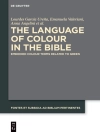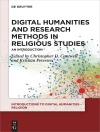It is asserted by Judaism, Christianity and Islam alike that sin is a central part of human life. Where sin comes from, however, is answered differently in the respective religions. While both the Bible and the Qur’an agree that there was a kind of ‘fall’ of Adam at the beginning of human history, this fall is interpreted solely in classical Christian theology in terms of an ‘original’ or ‘ancestral sin.’ Moreover, the classical doctrine of original sin is becoming increasingly called into question in today’s Christian theology. This example already shows that the concept of sin is anything but clear. What does sin mean? Is sin primarily a violation of God’s commandments? Or does the term ‘sin’ refer to a radical corruption of man’s nature? How does sin relate to man’s redemption, toward which all three religions aim? The book ‘The Concept of Sin in Judaism, Christianity and Islam’ addresses these and related questions. It analyzes how ‘sin’ has been understood in the three religions in the past and the present and points out similarities and differences.
Sobre o autor
Christoph Böttigheimer and Konstantin Kamp, Catholic University of Eichstätt-Ingolstadt, Germany.












